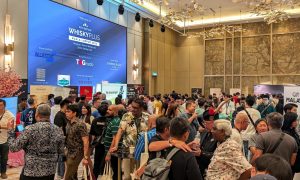Hand weaving of any fabric is an arduous and time-consuming process, requiring concentration at all times, and the learning of the appropriate skills requires practice and patience. The supplementary weft technique – the process of adding pattern to fabric – further complicates this process, and yet the process, known in Malaysia as songket weaving, has been practised in this country for generations.
Despite a steady supply of consumers seeking the beautiful songkets for wearing and cherishing, the era of modernisation and mechanisation has seen weavers abandoning their craft for less intense sources of making an income, and many fabrics are now churned out by machines.
Thankfully, Tanoti – a company owned and run by Malaysian Jacqueline Fong in Sarawak – is determined to do what it can to preserve and protect the traditional methods of songket weaving in this modern age. As of May 2012, Tanoti assumed the employment of the Sarawakian weavers previously housed under the Yayasan Tuanku Nur Zahirah in order to establish and cultivate a vibrant community of artisans dedicated to practising the ancient craft that is such an integral part of Malaysia’s heritage.
There are now nineteen weavers employed by Tanoti, and these women are trained to weave two different styles of songket: the Sarawakian and Peninsular Malaysian techniques. Hailing from villages around Kuching (where the centre is located), the weavers’ abilities vary from the highly experienced to apprentices, and yet all are committed to creating beautiful fabrics and are grateful for the opportunity to support themselves in a way that brings them satisfaction and utilises their admirable skills.
Weaving a songket is no easy process, and the weavers at Tanoti are meticulous in their attention to detail at every stage of the creation process. .e team work together on different elements of each songket, so the finished article represents the hard work of many women and is unique.
The process involves 11 different stages, beginning with the pattern design (Mereka Corak) before the threads are dyed and creation can begin. .e most arduous part of the process comes at the end (Menyongket), when the weaver has to incorporate the pattern onto the fabric using metallic threads, counting and removing certain warp threads to add the pattern in appropriately, all of which must be done by hand. It is hard, delicate work, but this attention to detail and handcrafted care shines through in the beautiful fabrics that are eagerly purchased.
As well as preserving the historical designs and traditions of songket weaving, Tanoti seeks to create an environment in which weavers can bring in contemporary, modern designs and breathe a new life into the ancient craft. By blending the traditional approach and designs with more modern ideas, the Tanoti songket can appeal to a broad audience, and ensure that these pieces of textile art can continue to be appreciated by the public as a whole, however tastes change over time.
There is also an opportunity, for those interested in the process, to learn more about this ancient craft by visiting the Tanoti House in Kuching, where the weavers spend their days working. Visitors are able to enter the visitor’s gallery and observe the women weave their magic, before pausing in the retail showroom to pick up some of the products of the women’s labour. For a truly special and unique gift or memento, customers can submit their own designs and have a personalised songket made to suit them and their tastes.
As Malaysia pushes onwards to modernism, it becomes ever more important to preserve the traditional cultures and crafts of the country and offer opportunities to those with ancient skills to use them and maintain the industry while still earning a living. Tanoti is making an admirable step in preserving the art of songket weaving and celebrating the talents of the local Sarawakians, and a visit to the headquarters promises to be memorable indeed.
———————————————————————————————————
Tanoti House, 56 Tabuan Road, 93100 Kuching, Sarawak; 082.239 277;
open daily 9am-6pm (closed on major public holidays);
admission free. Learn more at www.tanoti crafts.com or email projects@ tanoticrafts.com.
———————————————————————————————————
Source: The Expat April 2013
Read more:
- H&M Malaysia: Products and Price Range
- A Celebration of Shoes
-
Top Five Places for Bargain Shopping in Malaysia
What are your thoughts on this article? Let us know by commenting below.No registration needed.
















